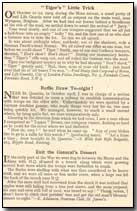Memoirs & Diaries - The Best 500 Cockney War Stories - "Tiger's" Little Trick and Other Stories
 Published in London
in 1921, The Best 500 Cockney War Stories
comprised, in the words of its newspaper publisher (The London Evening
News) "a remembering and retelling of those war days when laughter
sometimes saved men's reason".
Published in London
in 1921, The Best 500 Cockney War Stories
comprised, in the words of its newspaper publisher (The London Evening
News) "a remembering and retelling of those war days when laughter
sometimes saved men's reason".
The collection of short memoirs, some 500 in total, is divided into five categories - Action, Lull, Hospital, High Seas and Here and There. This page contains five stories from Action, led by "Tiger's" Little Trick.
Other sections within the collection can be accessed using the sidebar to the right.
"Tiger's" Little Trick
On October 11-12, 1914, during the Mons retreat, a small party of 2nd Life Guards were told off as outpost on the main road, near Wyngene, Belgium.
After we had tied our horses behind a farmhouse at the side of the road, we settled down to await the arrival of "Jerry."
Time went slowly, and one of our troopers suggested that we all put a half-franc into an empty "bully" tin, and the first one of us who shot a German was to take the lot. To this we all agreed.
It was about midnight when, suddenly, out of the shadows, rode a German Death's-head Hussar. We all raised our rifles as one man, but before we could shoot, "Tiger" Smith, one of our real Cockney troopers, shouted, "Don't shoot! Don't shoot!"
During our momentary hesitation "Tiger's" rifle rang out, and off rolled the German into the road.
Upon our indignant inquiry as to why he had shouted "Don't shoot," "Tiger" quietly said, "Nah, then, none of your old buck; just hand over that tin of 'elf francs I've won."
Fred Bruty (late Corporal of Horse, 2nd Life Guards), City of London Police Dwellings, No. 3, Ferndale Court, Ferndale Road, S.W.9
Raffle Draw To-night!
Near St. Quentin, in October 1918, I was in charge of a section that was detailed to cross a railway to establish communication with troops on the other side.
Unfortunately we were spotted by a German machine gunner, who made things very hot for us, two men being quickly hit. We managed, however, to reach a small mound where, by lying quite flat, we were comparatively safe.
Glancing in the direction from which we had come, I saw a man whom I recognised as "Topper" Brown, our company runner, dashing as hard as he could for the cover where we had sheltered.
"How do, corp?" he said when he came up. "Any of your blokes like to go in a raffle for this watch?" (producing same). "'Arf a franc a time; draw to-night in St. Quentin."
S. Hills (late Rifle Brigade), 213, Ripple Road, Barking
Exit the General's Dessert
In the early part of the War we were dug in between the Marne and the Aisne with H.Q. situated in a trench along which were growing several fruit trees which the troops were forbidden to touch.
The Boche were shelling with what was then considered to be heavy stuff, and we were all more or less under cover, when a large one hit the back of the trench near H.Q.
After the mess staff had recovered from the shock it was noticed that apples were still falling from a tree just above, and the mess corporal, his ears and eyes still full of mud, was heard to say: "Thank 'eaven, I shan't have to climb that perishin' tree and get the old man's bloomin' dessert to-night."
E. Adamson, Overseas Club, St. James's
"Try on this Coat, Sir"
In September 1916, while with the 17th K.R.R.C., I lost my overcoat in a billet fire at Mailly-Maillet and indented for a new one, which, however, failed to turn up.
We moved to Hebuterne, where the line was very lively and the working parties used to be strafed with "Minnies " all night.
One night, while on patrol, with nerves on the jump, I was startled to hear a voice at my elbow say, "Try this on." It was the Q.M.'s corporal with the overcoat!
I solemnly tried it on there and then in No Man's Land, about 300 yards in front of our front line and not very far from the German line.
The corporal quite casually explained that he had some difficulty in finding me out there in the dark, but he did not want the trouble of carrying stuff out of the line when we moved!
S.W. Chuckerbutty, (L.R.B. and K.R.R.C.), 3 Maida Hill West, London, W.2
On the Kaiser's Birthday
In the Brickstacks at Givenchy, 1916. The Germans were celebrating the Kaiser's birthday by putting a steady succession of "Minnies" into and around our front line trench.
Just when the strain was beginning to tell and nerves were getting jumpy, a little Cockney corporal jumped on the fire-step and, shaking his fist at the Germans forty yards away, bawled, "You wait till it's my ruddy birthday!"
Fritz didn't wait two seconds, but the little corporal had got his laugh and wasn't taking a curtain.
"Bison" (late R.W.F.)
Next - "Chuck Us Your Name Plate!" and four other stories
3 British Officers were executed by courts martial during the war, as opposed to 316 Private soldiers and 24 Non-Commissioned Officers. The vast majority were for desertions.
- Did you know?
